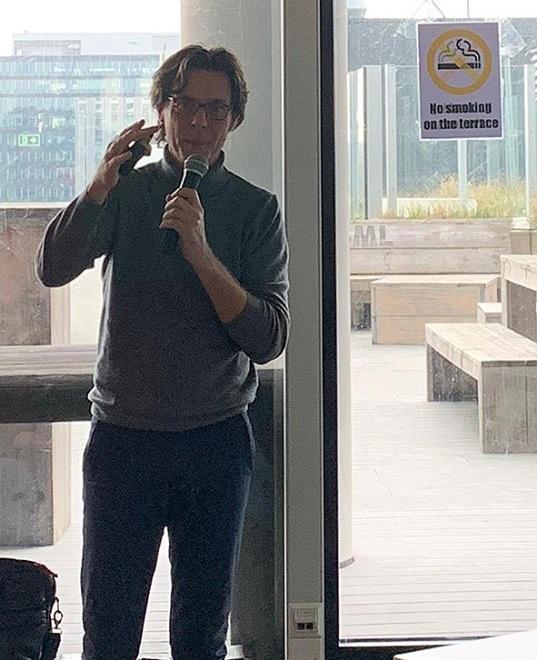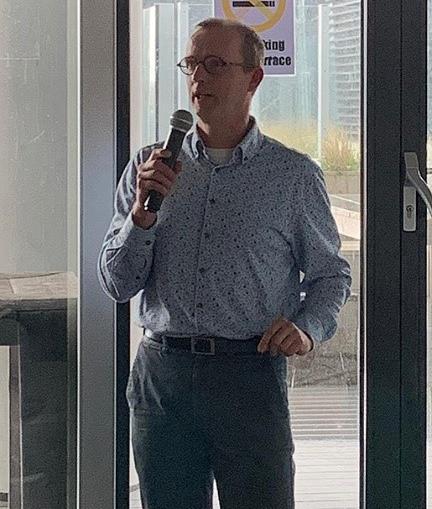The change from C3Te Colloquium toward a Science Café has to do to the fact that science is inspiring and it triggers our curiosity. Therefore, C3Te believes that a Science Café creates a dynamic informal environment compared to a formal more passive colloquium. With the change in name and environment, C3Te hopes that everybody feels free to participate and two-way interaction between the speakers and the audience will be created. So the Care & Cure Science Café will be there to learn from each other and create new valuable perspectives which we all can apply to our own research.
Dr. Noortje Bax, the project officer of C3Te was very proud and excited to announce the speakers of today, since “Matters of the Heart” are a topic very close to Noortje her own heart, since as a researcher she worked in the field of cardiac regenerative medicine in close collaboration with cardiologists. Due to personal circumstances Marcel van ‘t Veer wasn’t able to present, but C3Te will invite hem for a next Science Café.

As first speaker, the floor was for Prof. dr. Lukas Dekker, professor at both the department of Electrical Engineering (SPS) and Biomedical Engineering (Cardiovascular Biomechanics). Prof. Dekker is also one of the initiators of Eindhoven MedTech Innovation Center (e/MTIC), but maybe the most important is that he is a cardiologist-electrophysiologist at the Catharina Hospital in Eindhoven. Prof. Dekker and Noortje Bax share a common ambition in science and that is we need synergy between medical science and technology to make the next step in healthcare. Prof. Dekker want to boost the development of technological solutions to improve the quality of care for heart patients. In his presentation he introduced the audience to the world of Technological solutions for cardiac care. Prof. Lukas Dekker started off with the introduction in some technological developments that were very important for clinical cardiology. He followed with the impact of heart disease in the future on the society. The number of people suffering from heart disease is increasing due to the ageing population but also our life style (obesity).
The assumption is that in the Netherlands the number of people suffering from chronic cardiovascular disease will raise towards 1.9 million in 2030 which will result in healthcare cost going out of control. The coop with the raising patient numbers and the cost, the future of health care will be determined by: 1) value-based healthcare, 2) technology and data and 3) first time right decisions. Dr. Dekker explained how the Catharina Hospital is implementing value-based health care and med-tech solutions to improve care and how the Catharina is frontrunner in this approach.
In the second part of his talk, Dr. Dekker talked about the role of med-tech solutions and big data in atrial fibrillation, his field of expertise. With wearable devices to detect atrial fibrillation or sleep-apnea related atrial fibrillation which could improve screening and treatment of patient. Prof. Dekker concluded his talk that technology is considered the essential solution for future healthcare. Patient value is the unifying parameter in healthcare and technology is the added value for success to keep healthcare affordable.

Dr. Coen Hurkmans studied Physics in Utrecht and followed his training to become a clinical physicist in the Antoni van Leeuwenhoek in Amsterdam, where Dr. Hurkmans also dis his PhD on the Improvement of breast cancer irradiation techniques. Since 2001, he is a clinical physicist at the radiology department of the Catharina Hospital, with his expertise in radiation of cancer in the breast, the long and the brain. The audience looked quite surprised after hearing Dr. Hurkmans his expertise, since this Science Café is about “Matters of the Heart”. Recently, Dr. Hurkmans gained interest in the application of radiation in the heart not to treat cancer but as application in the treatment arrhythmias occurring in the ventricles of the heart.
The topic of presentation was “Stereotactic Ablative Cardiac Radiotherapy (STAR)” as treatment for ventricular tachycardia. These ventricular arrhythmias often are caused by scar tissue after a myocardial infarction and lead to sudden death, increased chances of heart failure and lower quality of life. Currently there are multiple treatment options but none of these provide permanent solutions and they have some disadvantages. In a clinical study published in the New England Journal of Medicine (IF 71!), in a very small cohort of 5 patients, noninvasive cardiac radiation for ablation of ventricular tachycardia showed very promising results. Trials in Europe with larger cohorts, 10 and 19 patients respectively, showed the same results. With technological innovation derived from the field of oncology, Dr. Hurkmans explains how the application of STAR can be improved for the field of clinical cardiology. Since mature results are needed, the STOPSTORM initiative was introduced in collaboration with the Catharina Hospital to perform a registered clinical trial to prove the beneficial effect and the efficacy of radiation of the heart in ventricular tachycardia.